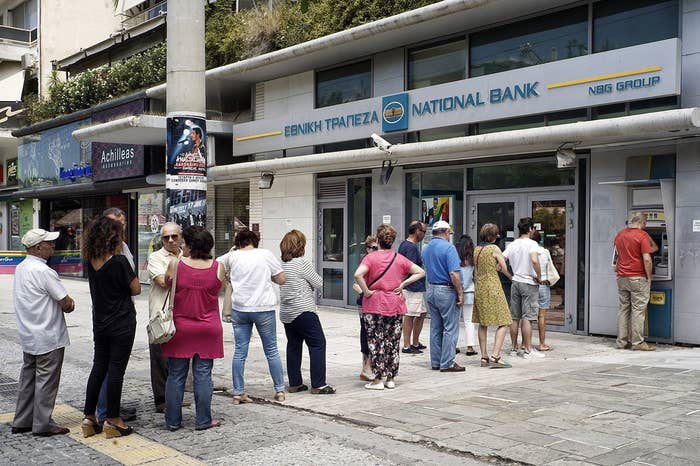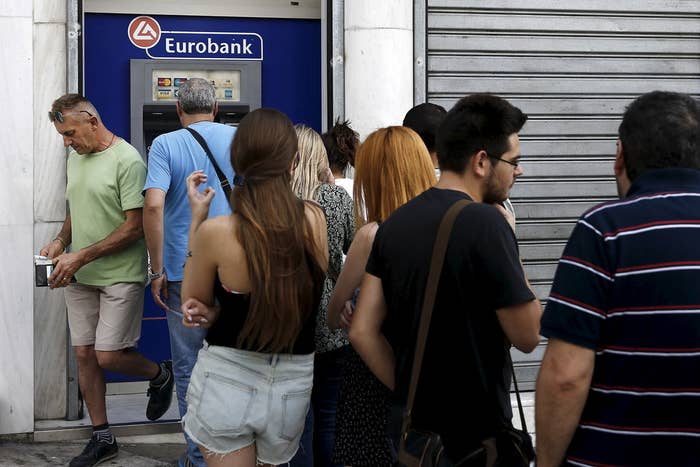
The Greek government announced on Monday that banks across the country will stay closed all week as capital controls are put in place after the European Central Bank refused to increase emergency funding to Greek banks on Sunday.
The news comes as Greece inches towards financial calamity after Athens and its European lenders failed to find common ground over the terms of a second financial bailout during protracted talks in Brussels over the past week.
Under capital controls, the amount of money people will be able to withdraw from ATMs will be restricted to 60 euros ($66). However, Prime Minister Alexis Tsipras said Greek bank accounts and pension funds are still secure.
Long lines were seen at many ATMs on Sunday as Greeks scrambled to withdraw whatever funds they could from their bank accounts before they closed.
On Monday, it was announced visitors and people with credit cards issued from abroad are exempt from the restrictions. Tourism accounts for at least a fifth of the country's economy, and Greece did not want to see it negatively impacted.
The day before, tourists had been seen anxiously waiting in the long ATM lines for money because they did not yet know the specifics of the restrictions.

"In these critical hours, we must remember that the only thing to fear is fear itself," the prime minister wrote on Twitter Sunday.
"The recent decisions of the Eurogroup & ECB have only one objective: to attempt to stifle the will of the Greek people," he said.
"They will not succeed. The very opposite will occur: The Greek people will stand firm with even greater willfulness."
A second bailout package is seen as essential for the future of Greece's economy and ultimately its survival as a part of the euro, but negotiators have been at loggerheads and have failed to reach a deal.
Athens is scheduled to repay $1.7 billion to the International Monetary Fund (IMF) by Tuesday. Officials said defaulting on that repayment could trigger Greece's exit from the euro.
In spite of the looming deadline, the EU, led by Germany and the wealthier northern European countries, has refused to lend any more money to the Greek government unless it undertakes further austerity measures, such as welfare and pension cuts.
Under such policies, the country's economy has shrunk by 25% over the last five years.
Tsipras came to power earlier this year on the promise that he would end the climate of austerity imposed on his country by the IMF, the European Commission and the EU, and turn a new leaf in the relationship between wealthier EU nations and poorer ones.
But Greece is in desperate need of cash — it is estimated 25% of the population is now unemployed — to pay for both the country's foreign debt and its domestic expenditure.
Germany and its European partners maintain that it is their taxpayers' money that's being lent to Greece, and that if Athens wants to keep receiving the EU's financial help, it needs to abide by its rules.
Tsipras has called a referendum for July 5 to give Greek voters the chance to have a say on whether the country should accept the austerity terms of the bailout conditions.

In a statement by the ECB, Governor of the Bank of Greece Yannis Stournaras is quoted as saying:
The Bank of Greece, as a member of the Eurosystem, will take all measures necessary to ensure financial stability for Greek citizens in these difficult circumstances.
After the capital controls were announced on Sunday, protesters congregated outside the parliament in Athens to demonstrate against the country's austerity polices.
Protestors gathering outside Greek parliament after announcement of capital controls.
Greece is due to repay $1.7 billion to the IMF on Tuesday. A previous version of this piece stated Greece is due to repay $2.5 billion.


